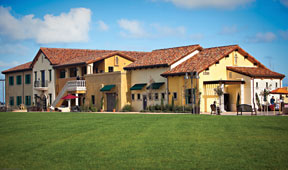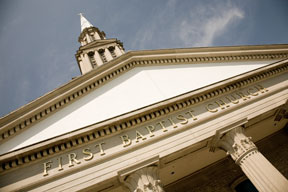
Christ Community Church, St. Charles, IL
In early 2012, Christ Community Church (CCC) learned about the plight of Sudan’s Nuba people through Samaritan’s Purse, a Christian humanitarian organization.
The Nuba people are primarily farmers who have been forced to flee from the Nuba Mountains because they are being attacked by their own government. Food is becoming scarce, and there is a risk of famine as these people have not been able to farm their fields.
Christ Community Church felt a burden to help. Because CCC has had a relatively healthy level of giving and has maintained its expenses, it was able to immediately give $80,000 from its surplus to Samaritan’s Purse.
But CCC didn’t stop there. The leaders felt it would be great if the church could give a little bit more, so they decided to share the need with the congregation and challenge everyone to give a special offering over two weekends. To encourage generous giving, the church offered to match every dollar that would be given. After a couple of weeks, CCC received $90,000 in special offerings from the congregation, which the church doubled. At this point, the donated funds totaled $260,000. However, even after the church had shut the campaign down, it still received another $8,000 from the congregation – raising the total donated funds to $268,000.
Mark Ahrenholz, chief financial officer, says the church was able to react quickly to a need because of the generous support of the congregation throughout the year, “allowing us to have some reserve available for something like this.”
Ahrenholz says the 28-day devotional booklet on generosity by Gordon MacDonald was a big factor for inspiring church members to take their giving to the next level. At a time when the economy was down, Ahrenholz says the Holy Spirit was at work in the hearts of so many people to make sacrifices and increase their giving.
[Source: Mark Ahrenholz, chief financial officer]
Stewardship in tough times
 North Coast Calvary Chapel, Carlsbad, CA
North Coast Calvary Chapel, Carlsbad, CA
North Coast Calvary Chapel moved to its new campus in 2008, at the onset of the recession. The church felt and still feels the impact of the financial crisis. Many members lost their jobs and had to go elsewhere to find work and affordable housing. This affected church giving and, consequently, the building campaign.
To alleviate the situation, North Coast Calvary Chapel did the following:
- Froze all salaries for three years, from 2009 to 2011.
- Initiated a special giving fund for members who could afford to give over and above their tithes, so that no employees would be terminated due to the recession.
- Refinanced its long-term debt as rates continued to decline.
Twenty-five percent of church members who tithe supported the special fund, allowing North Coast Calvary to operate without any layoffs during the difficult times.
North Coast Calvary doesn’t use any consultants for fundraising or financial management.
What it has is a rigid financial control process under the oversight of a finance committee composed of accomplished business leaders in the community who also are church members. An audit sub-committee provides internal auditing of financial controls. Giving reports are provided weekly and detailed financial reports are provided monthly. An independent audit is performed annually.
Today, phase one of the building project is complete. For the next phase, all the design work has been completed, and half of the funds required to begin construction have been raised.
[Source: Art Braun, controller and system administrator]
Financially transparent
 First Baptist Church of West Palm Beach, FL
First Baptist Church of West Palm Beach, FL
Four years ago, First Baptist Church of West Palm Beach was faced with too many expenditures and too little revenue. Unfortunately, this conundrum is faced by many churches. To resolve this challenge, the church made the decision to do less with less and become highly efficient stewards of its resources.
The operating budget was reduced through a variety of ways, including personnel reduction, closing down buildings, and decreasing programmatic expectations. Many tough, necessary decisions were made to ensure that it operated within its means. Four years later, FBC is experiencing the fruit of those decisions. The church is more financially sound and is a better steward of God’s resources.
A simplifying of the budget and a transparent process has greatly encouraged and increased support for the financial practices of the church. Most individuals find it difficult to support or find great excitement in something that they do not fully understand.
When FBC communicates its budget to the congregation, it does not try to show off the vast, complex understanding of the numbers. It uses common language and examples to communicate the
information.
The process is transparent. Every month the church reports its finances to a committee of church-nominated financial laypeople. They serve as advisors. At any time, a church member may meet with someone in our financial department to view and discuss finances.
The numbers are audited annually, and the church is a member of the Evangelical Council for Financial Accountability. These efforts have produced a great level of trust among congregants in the way it handles its gifts to God. Because congregants understand and trust the presentation of finances, they are more excited to financially participate in the local church.
[Source:Art Rainer, administrative pastor]
Open disclosure
Philadelphia Baptist Church, Deville, LA
In 1995, Philip Robertson was a fresh graduate of New Orleans Baptist Theological Seminary when he became the pastor of Philadelphia Baptist Church (PBC). Year after year, under his leadership, the church has either met or exceeded its annual budget. The church has consistently run a fiscally conservative financial path. Robertson believes in building trust among his congregation by openly communicating the church’s financial goals – weekly through the bulletin, and annually when the budget is presented. Each staff member is asked to share in writing their annual budget plans and how these plans will help PBC reach its community and surrounding region.
PBC uses a financial management platform through ACS Technologies, which allows key leaders to have access to important integrated information. Since 1995, the church has benefited from the stewardship expertise of Cargill Associates and The Gage Group. In 2009, inspired by Sagemont Church in Houston, TX, PBC adopted a “building without borrowing” mindset. Since then, PBC has done several million dollars’ worth of renovations, construction and capital improvements.
[Source: Dawson Bailey, associate pastor]



